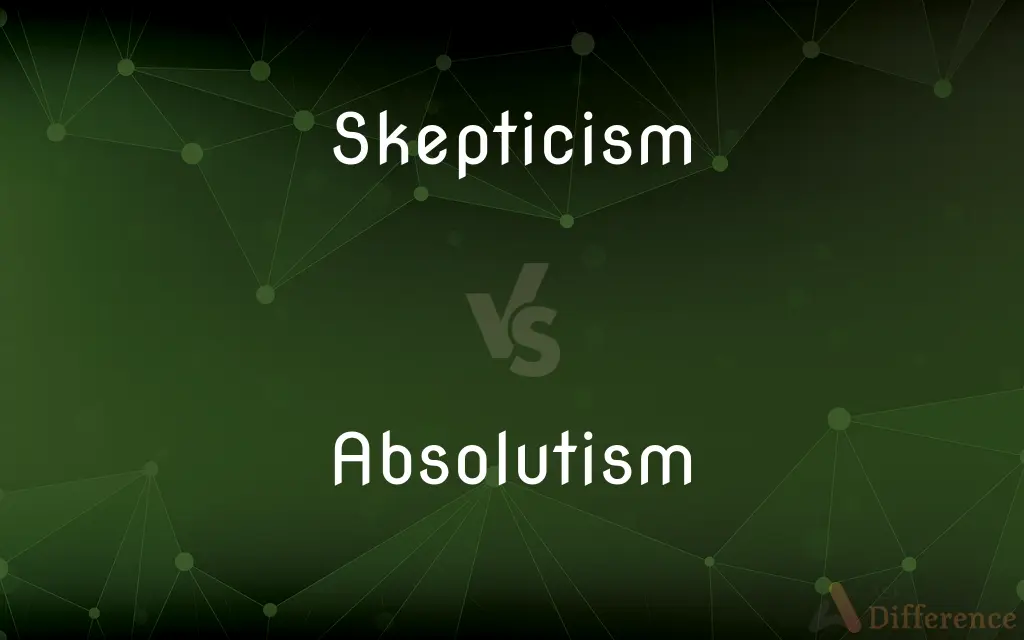Skepticism vs. Absolutism — What's the Difference?
Edited by Tayyaba Rehman — By Urooj Arif — Updated on April 15, 2024
Skepticism advocates for questioning certainty and embracing doubt in knowledge, while absolutism asserts definite truths and principles in beliefs or governance.

Difference Between Skepticism and Absolutism
Table of Contents
ADVERTISEMENT
Key Differences
Skepticism centers on the philosophical stance that knowledge is uncertain and that claims should be questioned. In contrast, absolutism upholds a belief in definitive truths, whether in moral, philosophical, or political realms.
Skeptics often challenge the status quo by promoting continuous inquiry and debate, whereas absolutists might discourage such questioning, favoring established doctrines or rules.
Skepticism encourages a provisional approach to truth, suggesting that assertions should always be open to reevaluation. On the other hand, absolutism often entails unwavering adherence to predetermined truths, which can manifest in dogmatic or authoritarian practices.
In political contexts, skepticism can lead to a more democratic and pluralistic governance structure, where various perspectives are considered and debated. Conversely, political absolutism typically involves centralized power and decision-making, often leading to autocratic rule.
Skeptics value the diversity of opinions as a means to enhance understanding and foster progress. Meanwhile, absolutists may view such diversity as a threat to coherence and stability.
ADVERTISEMENT
Comparison Chart
Definition
Philosophy doubting certainty in knowledge
Belief in unassailable truths or authority
Epistemological
Questions certainty; promotes continual inquiry
Embraces fixed truths; discourages questioning
Political Impact
Favors democratic, pluralistic approaches
Supports autocratic, centralized governance
View on Truth
Truth is provisional and evolving
Truth is fixed and unchanging
Social Implication
Encourages debate and diversity of thought
May suppress dissent and enforce uniformity
Compare with Definitions
Skepticism
Inquiry into the nature and grounds of knowledge.
Philosophy classes often encourage skepticism to deepen understanding.
Absolutism
A political theory granting unlimited authority to a ruler.
The prince was a firm believer in absolutism to maintain order.
Skepticism
The theory that certain knowledge is impossible.
Skepticism of empirical knowledge questions our ability to know the physical world.
Absolutism
The principle or the exercise of complete and unrestricted power.
Absolutism was often justified by divine right.
Skepticism
A skeptical attitude; doubt as to the truth of something.
Her skepticism was evident as she questioned every detail of the proposal.
Absolutism
Doctrine asserting unwavering adherence to principles.
His absolutism on policy decisions often caused friction.
Skepticism
Refusal to accept things at face value.
His natural skepticism made him a thorough researcher.
Absolutism
A form of government with unrestricted power.
His book on historical kings explored the dangers of absolutism.
Skepticism
Doubt as to the veracity of something.
His skepticism about the project's feasibility grew.
Absolutism
The acceptance of or belief in absolute principles.
In moral absolutism, there are clear rights and wrongs.
Skepticism
Skepticism (American and Canadian English) or scepticism (British, Irish, Australian, and New Zealand English) is generally a questioning attitude or doubt towards one or more putative instances of knowledge which are asserted to be mere belief or dogma. Formally, skepticism is a topic of interest in philosophy, particularly epistemology.
Absolutism
A political theory holding that all power should be vested in one ruler or other authority.
Skepticism
A doubting or questioning attitude or state of mind; dubiety.
Absolutism
A form of government in which all power is vested in a single ruler or other authority.
Skepticism
The ancient school of Pyrrho of Elis that stressed the uncertainty of our beliefs in order to oppose dogmatism.
Absolutism
An absolute doctrine, principle, or standard.
Skepticism
The doctrine that absolute knowledge is impossible, either in a particular domain or in general.
Absolutism
(theology) Doctrine of preordination; doctrine of absolute decrees; doctrine that God acts in an absolute manner.
Skepticism
A methodology based on an assumption of doubt with the aim of acquiring approximate or relative certainty.
Absolutism
The principles or practice of absolute or arbitrary government; despotism.
Skepticism
Doubt or disbelief of religious tenets.
Absolutism
(philosophy) Belief in a metaphysical absolute; belief in Absolute.
Skepticism
The practice or philosophy of being a skeptic.
Absolutism
Positiveness; the state of being absolute.
Skepticism
A studied attitude of questioning and doubt
Absolutism
(rare) The characteristic of being absolute in nature or scope; absoluteness.
Skepticism
The doctrine that absolute knowledge is not possible
Absolutism
The state of being absolute; the system or doctrine of the absolute; the principles or practice of absolute or arbitrary government; despotism.
The element of absolutism and prelacy was controlling.
Skepticism
A methodology that starts from a neutral standpoint and aims to acquire certainty though scientific or logical observation.
Absolutism
Doctrine of absolute decrees.
Skepticism
Doubt or disbelief of religious doctrines
Absolutism
Dominance through threat of punishment and violence
Skepticism
An undecided, inquiring state of mind; doubt; uncertainty.
That momentary amazement, and irresolution, and confusion, which is the result of skepticism.
Absolutism
A form of government in which the ruler is an absolute dictator (not restricted by a constitution or laws or opposition etc.)
Skepticism
The doctrine that no fact or principle can be certainly known; the tenet that all knowledge is uncertain; Pyrrohonism; universal doubt; the position that no fact or truth, however worthy of confidence, can be established on philosophical grounds; critical investigation or inquiry, as opposed to the positive assumption or assertion of certain principles.
Absolutism
The principle of complete and unrestricted power in government
Skepticism
A doubting of the truth of revelation, or a denial of the divine origin of the Christian religion, or of the being, perfections, or truth of God.
Let no . . . secret skepticism lead any one to doubt whether this blessed prospect will be realized.
Absolutism
The doctrine of an absolute being
Skepticism
Doubt about the truth of something
Skepticism
The disbelief in any claims of ultimate knowledge
Common Curiosities
How does absolutism differ from skepticism in terms of belief?
Absolutism holds that certain truths or principles are definitive and unquestionable, unlike skepticism which doubts certainty.
What are the dangers of absolutism in politics?
Political absolutism can lead to autocratic governance, suppressing dissent and limiting freedoms.
What is skepticism?
Skepticism is a philosophical stance that emphasizes questioning and doubting accepted beliefs and claims.
Can absolutism be beneficial?
In some contexts, absolutism can provide clear direction and decisive leadership, though it often curtails personal freedoms.
How do skeptics handle conflicting information?
Skeptics evaluate conflicting information through critical thinking and seeking evidence, rather than accepting it outright.
How do skepticism and absolutism approach the concept of truth?
Skepticism sees truth as evolving and open to questioning, while absolutism views it as fixed and absolute.
Is skepticism a form of cynicism?
No, skepticism involves thoughtful questioning and inquiry, whereas cynicism generally assumes negative outcomes.
What historical examples illustrate absolutism?
Examples include the reign of Louis XIV of France and the rule of Tsar Nicholas I of Russia.
Can skepticism be applied in everyday life?
Yes, skepticism can be applied by critically analyzing information and not taking claims at face value.
What role does skepticism play in science?
Skepticism is fundamental in science, as it drives the testing of hypotheses and the verification of data of your network.
Share Your Discovery

Previous Comparison
Guidance vs. Instruction
Next Comparison
Bloom vs. FlourishAuthor Spotlight
Written by
Urooj ArifUrooj is a skilled content writer at Ask Difference, known for her exceptional ability to simplify complex topics into engaging and informative content. With a passion for research and a flair for clear, concise writing, she consistently delivers articles that resonate with our diverse audience.
Edited by
Tayyaba RehmanTayyaba Rehman is a distinguished writer, currently serving as a primary contributor to askdifference.com. As a researcher in semantics and etymology, Tayyaba's passion for the complexity of languages and their distinctions has found a perfect home on the platform. Tayyaba delves into the intricacies of language, distinguishing between commonly confused words and phrases, thereby providing clarity for readers worldwide.















































